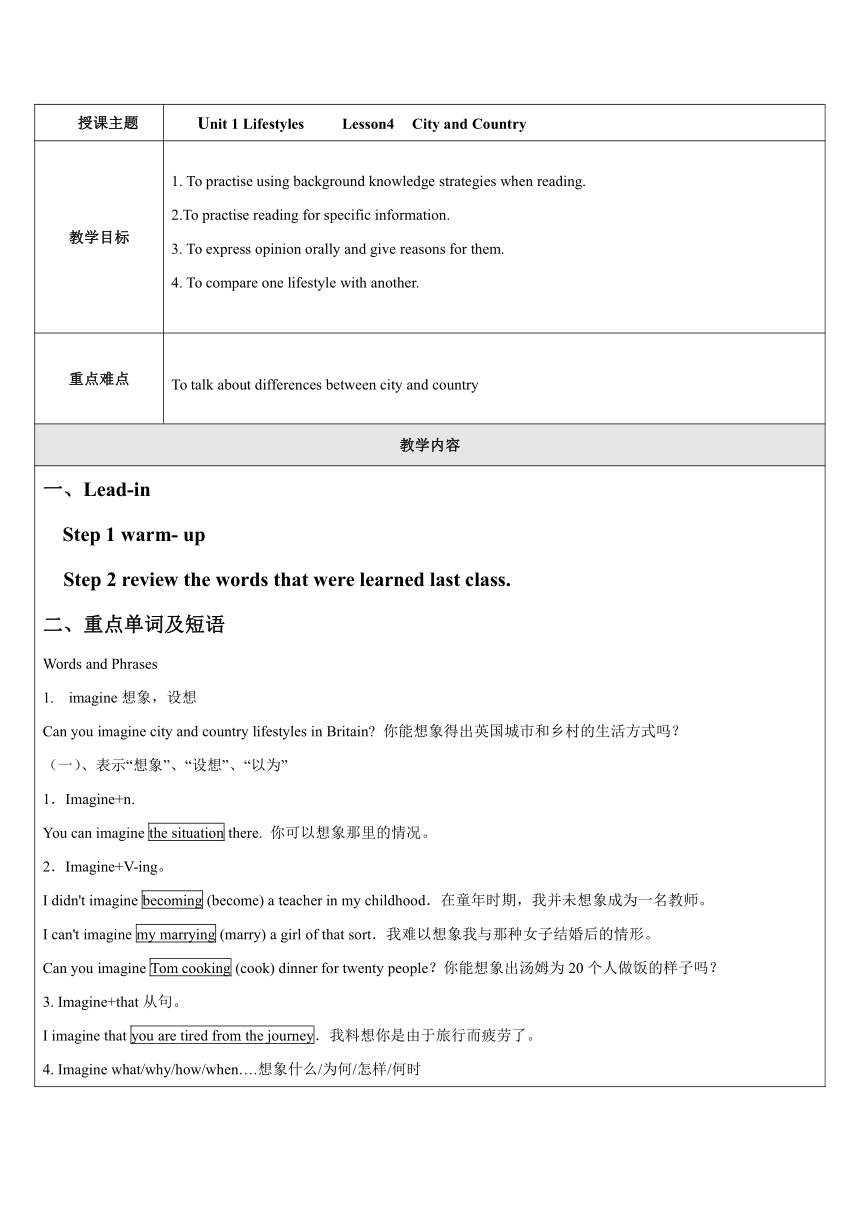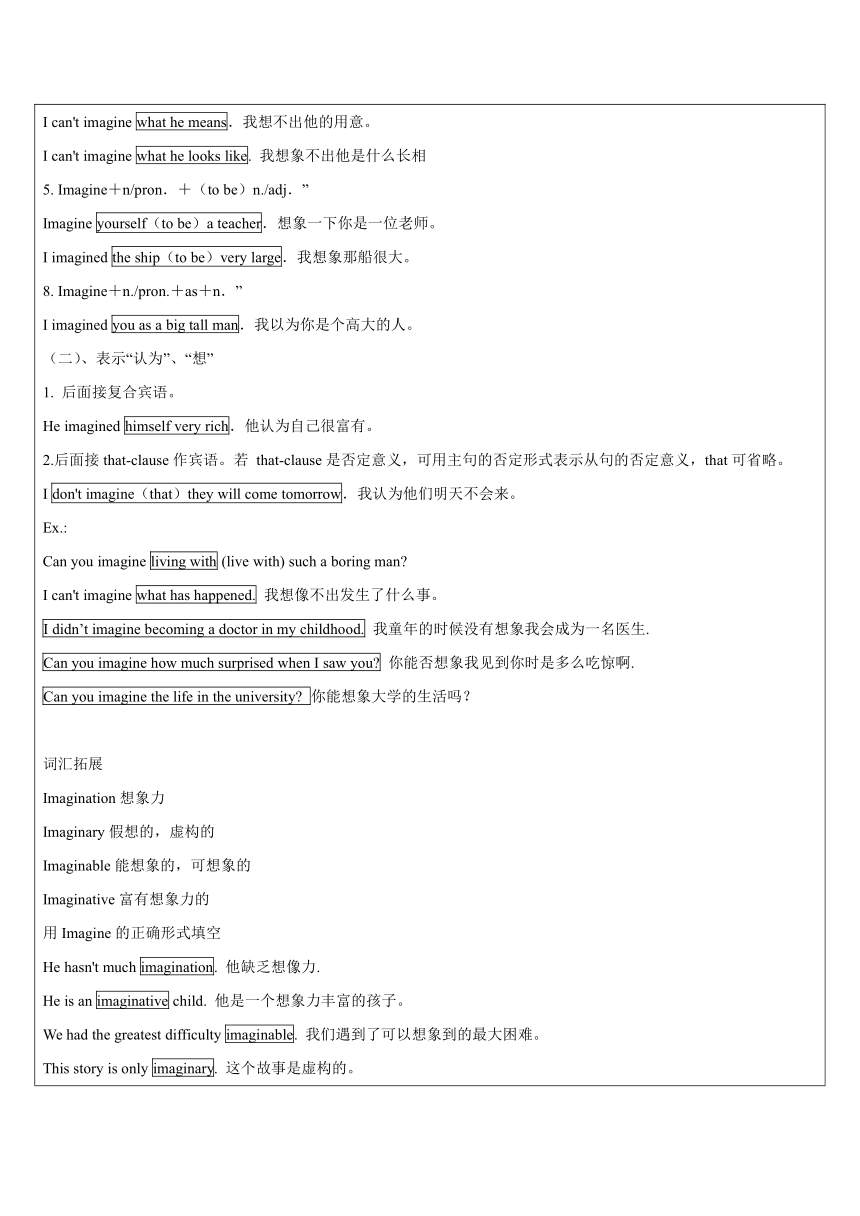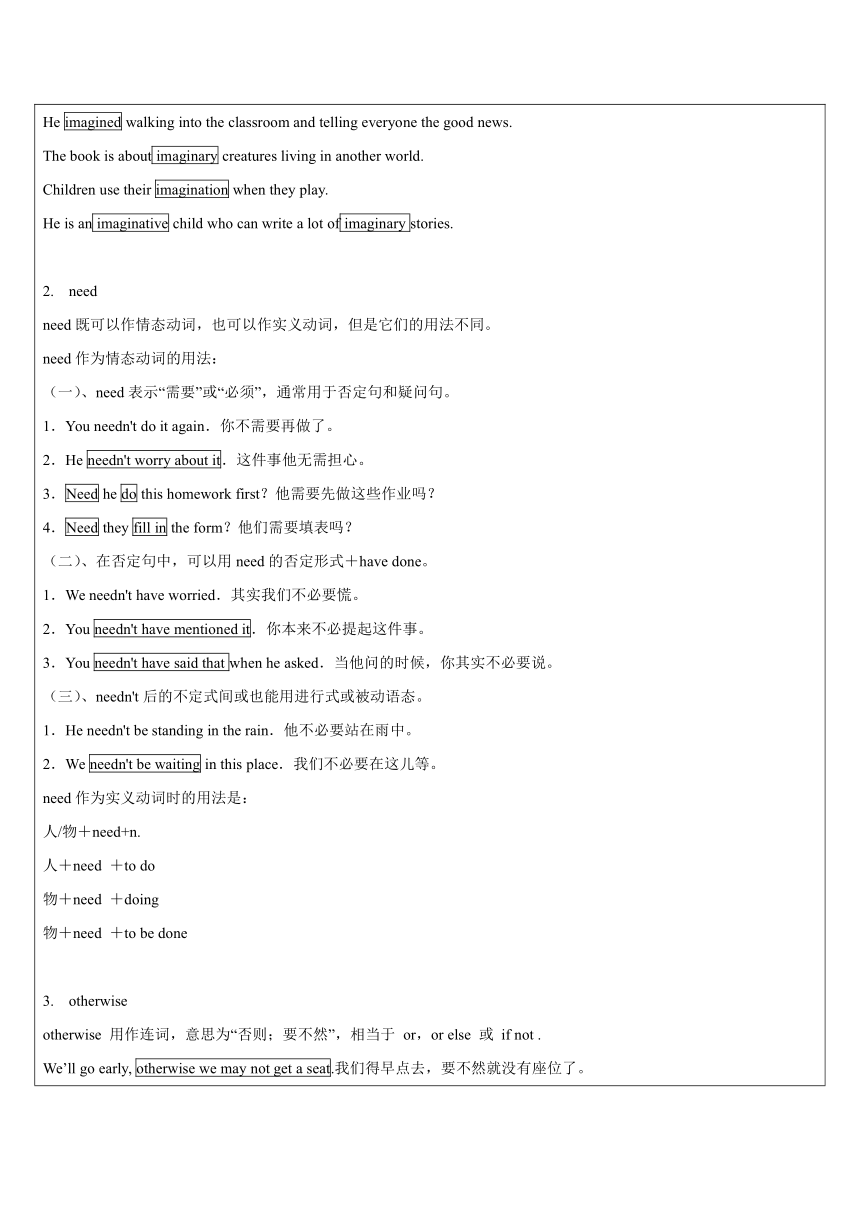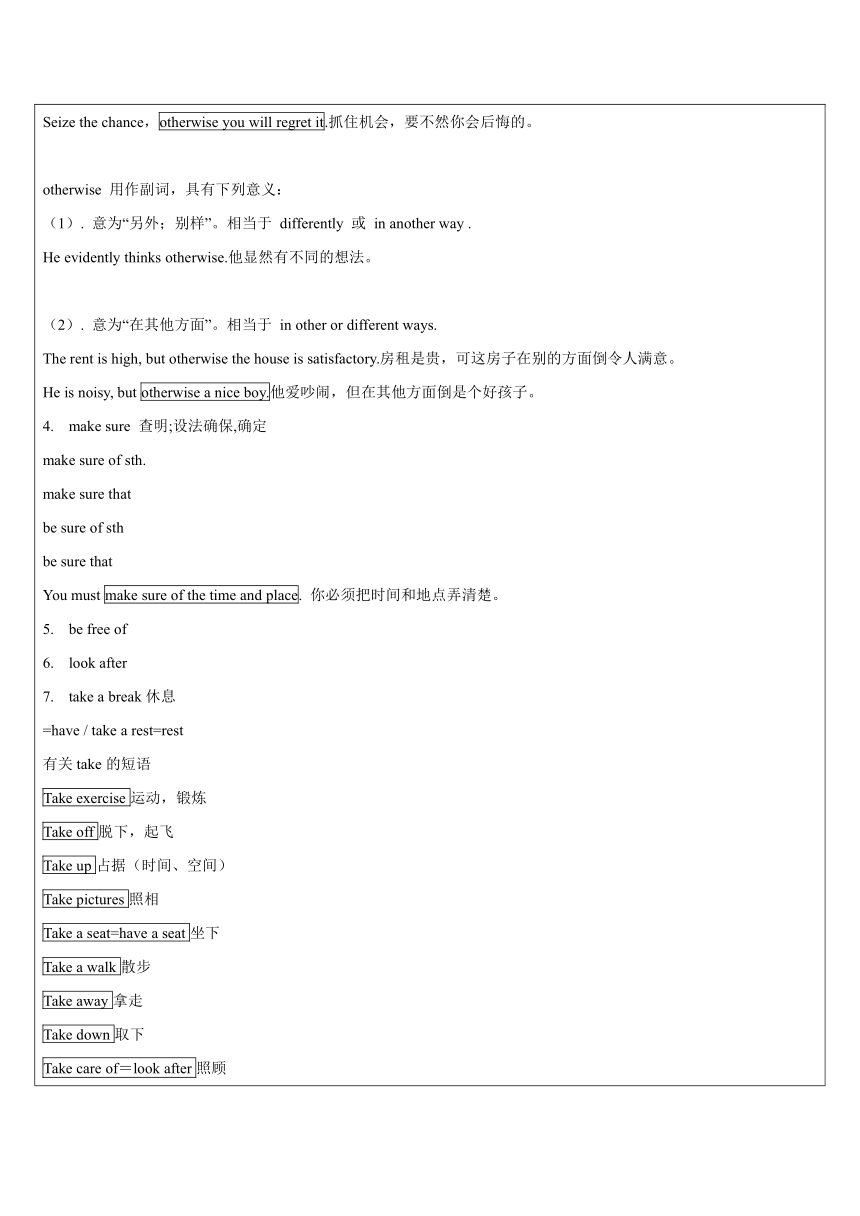高中英语北师大版必修一 Unit 1 Lifestyles Lesson 4 同步教案(表格式)
文档属性
| 名称 | 高中英语北师大版必修一 Unit 1 Lifestyles Lesson 4 同步教案(表格式) |

|
|
| 格式 | zip | ||
| 文件大小 | 29.5KB | ||
| 资源类型 | 教案 | ||
| 版本资源 | 北师大版 | ||
| 科目 | 英语 | ||
| 更新时间 | 2022-01-15 00:00:00 | ||
图片预览





文档简介
授课主题 Unit 1 Lifestyles Lesson4 City and Country
教学目标 1. To practise using background knowledge strategies when reading. 2.To practise reading for specific information. 3. To express opinion orally and give reasons for them. 4. To compare one lifestyle with another.
重点难点 To talk about differences between city and country
教学内容
一、Lead-in Step 1 warm- up Step 2 review the words that were learned last class. 二、重点单词及短语 Words and Phrases imagine想象,设想 Can you imagine city and country lifestyles in Britain 你能想象得出英国城市和乡村的生活方式吗? (一)、表示“想象”、“设想”、“以为” 1.Imagine+n. You can imagine the situation there. 你可以想象那里的情况。 2.Imagine+V-ing。 I didn't imagine becoming (become) a teacher in my childhood.在童年时期,我并未想象成为一名教师。 I can't imagine my marrying (marry) a girl of that sort.我难以想象我与那种女子结婚后的情形。 Can you imagine Tom cooking (cook) dinner for twenty people?你能想象出汤姆为20个人做饭的样子吗? 3. Imagine+that从句。 I imagine that you are tired from the journey.我料想你是由于旅行而疲劳了。 4. Imagine what/why/how/when….想象什么/为何/怎样/何时 I can't imagine what he means.我想不出他的用意。 I can't imagine what he looks like. 我想象不出他是什么长相 5. Imagine+n/pron.+(to be)n./adj.” Imagine yourself(to be)a teacher.想象一下你是一位老师。 I imagined the ship(to be)very large.我想象那船很大。 8. Imagine+n./pron.+as+n.” I imagined you as a big tall man.我以为你是个高大的人。 (二)、表示“认为”、“想” 1. 后面接复合宾语。 He imagined himself very rich.他认为自己很富有。 2.后面接that-clause作宾语。若 that-clause是否定意义,可用主句的否定形式表示从句的否定意义,that可省略。 I don't imagine(that)they will come tomorrow.我认为他们明天不会来。 Ex.: Can you imagine living with (live with) such a boring man I can't imagine what has happened. 我想像不出发生了什么事。 I didn’t imagine becoming a doctor in my childhood. 我童年的时候没有想象我会成为一名医生. Can you imagine how much surprised when I saw you 你能否想象我见到你时是多么吃惊啊. Can you imagine the life in the university 你能想象大学的生活吗? 词汇拓展 Imagination想象力 Imaginary假想的,虚构的 Imaginable能想象的,可想象的 Imaginative富有想象力的 用Imagine的正确形式填空 He hasn't much imagination. 他缺乏想像力. He is an imaginative child. 他是一个想象力丰富的孩子。 We had the greatest difficulty imaginable. 我们遇到了可以想象到的最大困难。 This story is only imaginary. 这个故事是虚构的。 He imagined walking into the classroom and telling everyone the good news. The book is about imaginary creatures living in another world. Children use their imagination when they play. He is an imaginative child who can write a lot of imaginary stories. need need既可以作情态动词,也可以作实义动词,但是它们的用法不同。 need作为情态动词的用法: (一)、need表示“需要”或“必须”,通常用于否定句和疑问句。 1.You needn't do it again.你不需要再做了。 2.He needn't worry about it.这件事他无需担心。 3.Need he do this homework first?他需要先做这些作业吗? 4.Need they fill in the form?他们需要填表吗? (二)、在否定句中,可以用need的否定形式+have done。 1.We needn't have worried.其实我们不必要慌。 2.You needn't have mentioned it.你本来不必提起这件事。 3.You needn't have said that when he asked.当他问的时候,你其实不必要说。 (三)、needn't后的不定式间或也能用进行式或被动语态。 1.He needn't be standing in the rain.他不必要站在雨中。 2.We needn't be waiting in this place.我们不必要在这儿等。 need作为实义动词时的用法是: 人/物+need+n. 人+need +to do 物+need +doing 物+need +to be done otherwise otherwise 用作连词,意思为“否则;要不然”,相当于 or,or else 或 if not . We’ll go early, otherwise we may not get a seat.我们得早点去,要不然就没有座位了。 Seize the chance,otherwise you will regret it.抓住机会,要不然你会后悔的。 otherwise 用作副词,具有下列意义: (1). 意为“另外;别样”。相当于 differently 或 in another way . He evidently thinks otherwise.他显然有不同的想法。 (2). 意为“在其他方面”。相当于 in other or different ways. The rent is high, but otherwise the house is satisfactory.房租是贵,可这房子在别的方面倒令人满意。 He is noisy, but otherwise a nice boy.他爱吵闹,但在其他方面倒是个好孩子。 make sure 查明;设法确保,确定 make sure of sth. make sure that be sure of sth be sure that You must make sure of the time and place. 你必须把时间和地点弄清楚。 be free of look after take a break休息 =have / take a rest=rest 有关take的短语 Take exercise运动,锻炼 Take off脱下,起飞 Take up占据(时间、空间) Take pictures照相 Take a seat=have a seat坐下 Take a walk散步 Take away拿走 Take down取下 Take care of=look after照顾 unfortunately adv. 不幸的 fortune n. 运气 fortunate adj.幸运的,幸福的 fortunately adv. 幸运地 用fortune 的正确形式填空。 Fortunately the train was on time. 幸好火车按时到达。 Why should you be so fortunate! 你为何这样幸运! Fortune God sends fortune to fools. 傻人有傻福。 Unfortunately I made no copy of it. 遗憾的是,我没有抄一份留底。 be fond of喜欢 crowd crowds of成群的 crowded adj.拥挤的 be crowded with挤满…… distance distant in the distance at a distance of 三、难句解疑 That’s what people call the underground in London. (the tube) 就是人们对伦敦地铁的叫法。 句中what引导的从句为表语从句。What 在从句中作从句的宾语,the underground in London 为从句的宾语补足语,what 在这里的意思为“……的” 例:1) This is what I want to tell you. 这就是我要告诉你的事。 2)China is not what it used to be. 中国已经是今非昔比了。 2. Usually it’s so crowded that I can’t find anywhere to sit. 通常地铁和拥挤,很难找到座位。 句中so…that为连词,引导结果状语从句。 请注意:1. so+形容词/副词2. so+形容词+a(an)+名词 3. so+ many / few / little / much+ 名词。so…that 还可以引导目的状语从句,引导目的状语从句时,从句谓语动词常有情态动词,如:can / could, will / would, may / might。 例:1)He works so hard that he often forgets to eat and sleep. 他工作很努力,以至于经常忘记吃饭睡觉。 2)He is so good a teacher that all his students like him very much. 他是一位好老师,他的学生都喜欢他。 3)He had so many falls that he was black and blue all over. 他摔了很多跤,以致浑身青一块紫一块。 I need to do that because I don’t get enough exercise otherwise. 因为每天运动量不够,我需要增加些运动。 句中otherwise 为副词,意思为“否则,不然”。Otherwise 还有“除此以外”的意思。 例:楼上有些音乐声, 除此以外, 房子里静悄悄的。 We like to visit nice, quiet places far away from the city, and go walking where there are no shops, crowds or the tube. 我喜欢去那些远离城市、幽静、风光秀丽的地方,在没有商店、人群、地铁的地方漫步。 句中where为连词,引导地点状语从句,修饰动词go。 例:1) Sit where I can see you. 坐在我能看到你的地方。 2)We should go where we are needed most. 我们应该去最需要我们的地方。 After a big breakfast in my house, I walk out of the front door and I’, already at work. 饱餐一顿早饭之后,我走出家门,开始一天的工作。 句中be at work 意思为“在工作”。介词at在这里表示“处于……状态”。 例:The country is now at war. 这个国家正在打仗。 I felt at a disadvantage. 我觉得处于不利地位。 6. We don’t have the same work hours that office workers in the city have. 我们的工作时间和在办公室工作的人们不同。 句中that为关系代词,引导一个定语从句,修饰名词hours,在从句中作宾语。有时我们也用as 代替that。 the same …that 更强调同一事物。 例:This is the same man that asked me for money yesterday. 那个人就是昨天向我要钱的人。 7.This meal included cakes and sandwiches, and tea was served to wash down the food. 这顿饭有蛋糕和三明治,用茶来把事物送下去。 句中wash down 的意思为“用水等吞送(食物等)”。wash down还有“冲洗,流下”的意思。 例:The soil has washed down into the valley. 泥土被冲入了山谷。 In fact, the London Stock Exchange is believed to have started from these coffeehouses. 事实上,人们认为伦敦证券交易所的前身就是这些咖啡馆。 这句话等于In fact, people believe the London Stock Exchange has started from these coffeehouses. 在be believed后面跟动词不定式,to have started 为不定式的完成式。常用句型有It is said/ expected/reported等+动词不定式。 例:Tom is believed to be the child they looking for. 人们认为汤姆就是他们要找的那个孩子。 The vase is believed to be worth a lot of money. 人们相信这个花瓶价值连城。 四、课堂练习 翻译句子 这就是我想要做的事。 告诉我你在想什么。 那牛奶太好了,我们没办法不喝。 他是一位那么温文尔雅的人,我们大家都喜欢他。 有那么多食物可吃,以致我弟弟都不想离开那儿。 把窗户关好,不然屋里就太冷了。 他爱吵闹,除此之外在其他方面倒是一个好孩子。 我们得早一点儿去,不如就没座位了。 有志者事竟成。 哪里有烟,哪里就有火。(无风不起浪) 我想哈里斯先生正在吃饭。 目前这个地区正处于和平状态。 他手里的小刀和我丢的一模一样。 在这件事上,我和你的想法一样。 他们在刷车。 茶不能用来服药。 那个人可能被认为携带武器。 地球一度被人们认为是平的。 答案: This is what I want to do. Tell me what you are thinking about The milk was so good that we couldn’t stop drinking it. He is so gentle a man that we all like me. Shut the window. Otherwise it’ll get too cold in here. He is noisy, but otherwise a nice boy. We’ll go early. Otherwise we may not get a seat. We like to visit nice, quiet places far away from the city, and go walking where there are no shops, crowds or the tube. Where there is will, there is a way. Where there’s smoke, there’s fire. I think Mr. Harris is at dinner. At present this area is at peace. The knife I his hand is the same that I have lost. I think the same as you o about this. They are washing down a car. Tea can not be use to washed down medicine. The man may be believed to carry arms. The earth used to be believed to be flat. ~~~~~~~~~~~~~~~~~~~~~~~~~~~~~~~~~~~~~~~~~~~~~~~~~~~~~~~~~~~~~~~
教学目标 1. To practise using background knowledge strategies when reading. 2.To practise reading for specific information. 3. To express opinion orally and give reasons for them. 4. To compare one lifestyle with another.
重点难点 To talk about differences between city and country
教学内容
一、Lead-in Step 1 warm- up Step 2 review the words that were learned last class. 二、重点单词及短语 Words and Phrases imagine想象,设想 Can you imagine city and country lifestyles in Britain 你能想象得出英国城市和乡村的生活方式吗? (一)、表示“想象”、“设想”、“以为” 1.Imagine+n. You can imagine the situation there. 你可以想象那里的情况。 2.Imagine+V-ing。 I didn't imagine becoming (become) a teacher in my childhood.在童年时期,我并未想象成为一名教师。 I can't imagine my marrying (marry) a girl of that sort.我难以想象我与那种女子结婚后的情形。 Can you imagine Tom cooking (cook) dinner for twenty people?你能想象出汤姆为20个人做饭的样子吗? 3. Imagine+that从句。 I imagine that you are tired from the journey.我料想你是由于旅行而疲劳了。 4. Imagine what/why/how/when….想象什么/为何/怎样/何时 I can't imagine what he means.我想不出他的用意。 I can't imagine what he looks like. 我想象不出他是什么长相 5. Imagine+n/pron.+(to be)n./adj.” Imagine yourself(to be)a teacher.想象一下你是一位老师。 I imagined the ship(to be)very large.我想象那船很大。 8. Imagine+n./pron.+as+n.” I imagined you as a big tall man.我以为你是个高大的人。 (二)、表示“认为”、“想” 1. 后面接复合宾语。 He imagined himself very rich.他认为自己很富有。 2.后面接that-clause作宾语。若 that-clause是否定意义,可用主句的否定形式表示从句的否定意义,that可省略。 I don't imagine(that)they will come tomorrow.我认为他们明天不会来。 Ex.: Can you imagine living with (live with) such a boring man I can't imagine what has happened. 我想像不出发生了什么事。 I didn’t imagine becoming a doctor in my childhood. 我童年的时候没有想象我会成为一名医生. Can you imagine how much surprised when I saw you 你能否想象我见到你时是多么吃惊啊. Can you imagine the life in the university 你能想象大学的生活吗? 词汇拓展 Imagination想象力 Imaginary假想的,虚构的 Imaginable能想象的,可想象的 Imaginative富有想象力的 用Imagine的正确形式填空 He hasn't much imagination. 他缺乏想像力. He is an imaginative child. 他是一个想象力丰富的孩子。 We had the greatest difficulty imaginable. 我们遇到了可以想象到的最大困难。 This story is only imaginary. 这个故事是虚构的。 He imagined walking into the classroom and telling everyone the good news. The book is about imaginary creatures living in another world. Children use their imagination when they play. He is an imaginative child who can write a lot of imaginary stories. need need既可以作情态动词,也可以作实义动词,但是它们的用法不同。 need作为情态动词的用法: (一)、need表示“需要”或“必须”,通常用于否定句和疑问句。 1.You needn't do it again.你不需要再做了。 2.He needn't worry about it.这件事他无需担心。 3.Need he do this homework first?他需要先做这些作业吗? 4.Need they fill in the form?他们需要填表吗? (二)、在否定句中,可以用need的否定形式+have done。 1.We needn't have worried.其实我们不必要慌。 2.You needn't have mentioned it.你本来不必提起这件事。 3.You needn't have said that when he asked.当他问的时候,你其实不必要说。 (三)、needn't后的不定式间或也能用进行式或被动语态。 1.He needn't be standing in the rain.他不必要站在雨中。 2.We needn't be waiting in this place.我们不必要在这儿等。 need作为实义动词时的用法是: 人/物+need+n. 人+need +to do 物+need +doing 物+need +to be done otherwise otherwise 用作连词,意思为“否则;要不然”,相当于 or,or else 或 if not . We’ll go early, otherwise we may not get a seat.我们得早点去,要不然就没有座位了。 Seize the chance,otherwise you will regret it.抓住机会,要不然你会后悔的。 otherwise 用作副词,具有下列意义: (1). 意为“另外;别样”。相当于 differently 或 in another way . He evidently thinks otherwise.他显然有不同的想法。 (2). 意为“在其他方面”。相当于 in other or different ways. The rent is high, but otherwise the house is satisfactory.房租是贵,可这房子在别的方面倒令人满意。 He is noisy, but otherwise a nice boy.他爱吵闹,但在其他方面倒是个好孩子。 make sure 查明;设法确保,确定 make sure of sth. make sure that be sure of sth be sure that You must make sure of the time and place. 你必须把时间和地点弄清楚。 be free of look after take a break休息 =have / take a rest=rest 有关take的短语 Take exercise运动,锻炼 Take off脱下,起飞 Take up占据(时间、空间) Take pictures照相 Take a seat=have a seat坐下 Take a walk散步 Take away拿走 Take down取下 Take care of=look after照顾 unfortunately adv. 不幸的 fortune n. 运气 fortunate adj.幸运的,幸福的 fortunately adv. 幸运地 用fortune 的正确形式填空。 Fortunately the train was on time. 幸好火车按时到达。 Why should you be so fortunate! 你为何这样幸运! Fortune God sends fortune to fools. 傻人有傻福。 Unfortunately I made no copy of it. 遗憾的是,我没有抄一份留底。 be fond of喜欢 crowd crowds of成群的 crowded adj.拥挤的 be crowded with挤满…… distance distant in the distance at a distance of 三、难句解疑 That’s what people call the underground in London. (the tube) 就是人们对伦敦地铁的叫法。 句中what引导的从句为表语从句。What 在从句中作从句的宾语,the underground in London 为从句的宾语补足语,what 在这里的意思为“……的” 例:1) This is what I want to tell you. 这就是我要告诉你的事。 2)China is not what it used to be. 中国已经是今非昔比了。 2. Usually it’s so crowded that I can’t find anywhere to sit. 通常地铁和拥挤,很难找到座位。 句中so…that为连词,引导结果状语从句。 请注意:1. so+形容词/副词2. so+形容词+a(an)+名词 3. so+ many / few / little / much+ 名词。so…that 还可以引导目的状语从句,引导目的状语从句时,从句谓语动词常有情态动词,如:can / could, will / would, may / might。 例:1)He works so hard that he often forgets to eat and sleep. 他工作很努力,以至于经常忘记吃饭睡觉。 2)He is so good a teacher that all his students like him very much. 他是一位好老师,他的学生都喜欢他。 3)He had so many falls that he was black and blue all over. 他摔了很多跤,以致浑身青一块紫一块。 I need to do that because I don’t get enough exercise otherwise. 因为每天运动量不够,我需要增加些运动。 句中otherwise 为副词,意思为“否则,不然”。Otherwise 还有“除此以外”的意思。 例:楼上有些音乐声, 除此以外, 房子里静悄悄的。 We like to visit nice, quiet places far away from the city, and go walking where there are no shops, crowds or the tube. 我喜欢去那些远离城市、幽静、风光秀丽的地方,在没有商店、人群、地铁的地方漫步。 句中where为连词,引导地点状语从句,修饰动词go。 例:1) Sit where I can see you. 坐在我能看到你的地方。 2)We should go where we are needed most. 我们应该去最需要我们的地方。 After a big breakfast in my house, I walk out of the front door and I’, already at work. 饱餐一顿早饭之后,我走出家门,开始一天的工作。 句中be at work 意思为“在工作”。介词at在这里表示“处于……状态”。 例:The country is now at war. 这个国家正在打仗。 I felt at a disadvantage. 我觉得处于不利地位。 6. We don’t have the same work hours that office workers in the city have. 我们的工作时间和在办公室工作的人们不同。 句中that为关系代词,引导一个定语从句,修饰名词hours,在从句中作宾语。有时我们也用as 代替that。 the same …that 更强调同一事物。 例:This is the same man that asked me for money yesterday. 那个人就是昨天向我要钱的人。 7.This meal included cakes and sandwiches, and tea was served to wash down the food. 这顿饭有蛋糕和三明治,用茶来把事物送下去。 句中wash down 的意思为“用水等吞送(食物等)”。wash down还有“冲洗,流下”的意思。 例:The soil has washed down into the valley. 泥土被冲入了山谷。 In fact, the London Stock Exchange is believed to have started from these coffeehouses. 事实上,人们认为伦敦证券交易所的前身就是这些咖啡馆。 这句话等于In fact, people believe the London Stock Exchange has started from these coffeehouses. 在be believed后面跟动词不定式,to have started 为不定式的完成式。常用句型有It is said/ expected/reported等+动词不定式。 例:Tom is believed to be the child they looking for. 人们认为汤姆就是他们要找的那个孩子。 The vase is believed to be worth a lot of money. 人们相信这个花瓶价值连城。 四、课堂练习 翻译句子 这就是我想要做的事。 告诉我你在想什么。 那牛奶太好了,我们没办法不喝。 他是一位那么温文尔雅的人,我们大家都喜欢他。 有那么多食物可吃,以致我弟弟都不想离开那儿。 把窗户关好,不然屋里就太冷了。 他爱吵闹,除此之外在其他方面倒是一个好孩子。 我们得早一点儿去,不如就没座位了。 有志者事竟成。 哪里有烟,哪里就有火。(无风不起浪) 我想哈里斯先生正在吃饭。 目前这个地区正处于和平状态。 他手里的小刀和我丢的一模一样。 在这件事上,我和你的想法一样。 他们在刷车。 茶不能用来服药。 那个人可能被认为携带武器。 地球一度被人们认为是平的。 答案: This is what I want to do. Tell me what you are thinking about The milk was so good that we couldn’t stop drinking it. He is so gentle a man that we all like me. Shut the window. Otherwise it’ll get too cold in here. He is noisy, but otherwise a nice boy. We’ll go early. Otherwise we may not get a seat. We like to visit nice, quiet places far away from the city, and go walking where there are no shops, crowds or the tube. Where there is will, there is a way. Where there’s smoke, there’s fire. I think Mr. Harris is at dinner. At present this area is at peace. The knife I his hand is the same that I have lost. I think the same as you o about this. They are washing down a car. Tea can not be use to washed down medicine. The man may be believed to carry arms. The earth used to be believed to be flat. ~~~~~~~~~~~~~~~~~~~~~~~~~~~~~~~~~~~~~~~~~~~~~~~~~~~~~~~~~~~~~~~
